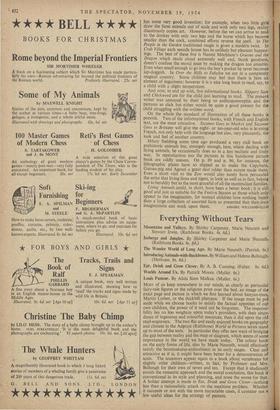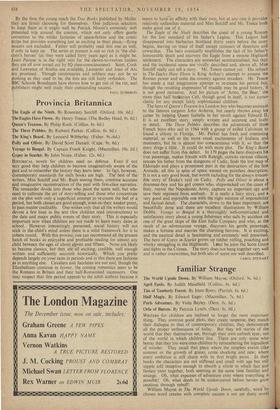Everything Without Tears
Mountains and Valleys. By Shirley Carpenter, Marie Neurath and Stewart Irwin. (Rathbone Books. 4s. 6d.) Icebergs and Jungles. By Shirley Carpenter and Marie Neurath. (Rathbone Books. 4s. 6d.) The Wonder World of Long Ago. By Marie Neurath. (Parrish. 6s.)
Introducing Animals-with-Backbones. By William and Helena Bullough. (Methuen. 8s. 6d.)
MOST of us keep somewhere in our minds, as clearly as particular fairy-tale figures or the religious print over the bed, an image of the exact page and picture in, which we first learned about banyan-trees, Martin Luther, or the duckbill platypus. If the image must be put aside while we choose books to satisfy the factual appetites of our own children, the power of it need not be forgotten. The responsi- bility lies no less weightily upon today's providers, with their abun- dance of ingenious and colourful resources, than it did upon the old steel-engravers. The two flat and easily enjoyed books on geography and climate in the Adprint (Rathbone) World in Pictures series stand up to most of the tests. In particular they offer new ways of bridging the gap between reality and the map or diagram, which seems of some importance in the world we have made today. The colour book on the early forms of life, also by Marie Neurath, would effectively satisfy the brontosaurus-enthralment in its early stages. Clear and attractive as it is, it might have been better for a demonstration of scale. The ancestors appear again in a book about vertebrates for slightly older children—written, in fact, by Professor and Mrs. Bullough for their own of seven and ten. Except that it studiously avoids the romantic approach and the moral conclusion, this book is conventional in its style and planning, and none the worse for that. A bolder attempt is made in Eat, Drink and Grow Clever—nothing less than a rationalistic attack on the mealtime problem. Whether it succeeds or not with the more intractable cases, it contains not a few useful ideas for the strategy of parents. By the time the young reach the True Books published by Muller they are firmly choosing for themselves. One judicious selection to keep them at it might well be Patrick Moore's extremely well presented trip around the cosmos, which not only offers gentle correction to the wilder fantasies of space-fiction and the comic Strips but provides something just as exciting in their place,—flying saucers not excluded. Father will probably read this one as well, if only to keep up. The series at present is not so rich in 'the chil- dren's heroes' (as they were called forty years ago) as it might be. Louis Pasteur is in the right vein for the eleven-to-twelves (unless they are all now sorted out by IQ class-consciousness). Scott, Cook and Lawrence of Arabia are available, Leonardo and Joan of Arc are promised. Though missionaries and soldiers may not be so pushing as they used to be, the lists are still fairly orthodox. The BBC Schools Broadcasts have shown how to get out of the rut, and Publishers might well study their outstanding success.
PAUL OUIBERON











































































 Previous page
Previous page